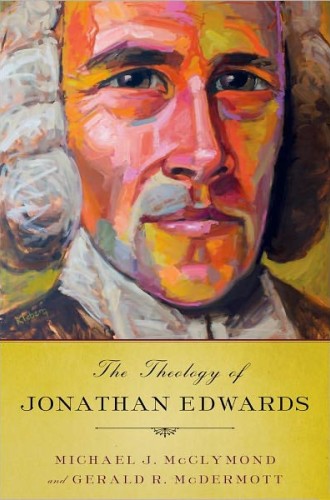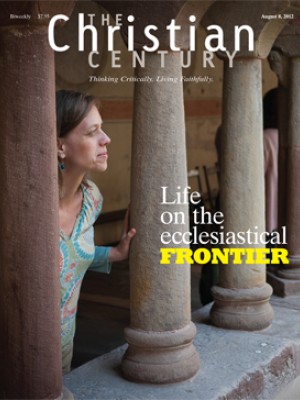The Theology of Jonathan Edwards, by Michael J. McClymond and Gerald R. McDermott
Like many people, when I first started reading Jonathan Edwards, I was dazzled, but I found much of his theology nearly unfathomable. Texts like Freedom of the Will and Original Sin, explicating the difference between moral and natural necessity and justifying our culpability for Adam’s sin, left me gasping in Edwards’s rarefied intellectual air. By contrast, his writings on piety and revival, such as the “Resolutions” and A Faithful Narrative of the Surprising Work of God, were both inspiring and comprehensible. As I studied American religious history at the doctoral level, Edwards’s sophisticated theology grew somewhat clearer to me. But still, when students or church friends asked me where to start with Edwards, I normally referred them to his writings on revival.
Study of Edwards has seen a renaissance in the past 30 years, keyed by Yale University Press’s The Works of Jonathan Edwards, which recently published its 26th and final volume. Biographical studies of Edwards have also flourished; George Marsden’s Jonathan Edwards: A Life (2003) is definitive. Now comes Michael McClymond and Gerald McDermott’s remarkable The Theology of Jonathan Edwards, which will undoubtedly become the standard scholarly introduction to his theology.
Read our latest issue or browse back issues.
Of course, legions of scholarly volumes and articles have been devoted to Edwards’s theology, and two recent companions to Edwards published by the university presses of Cambridge and Princeton have offered excellent overviews of his thought. But McClymond and McDermott introduce Edwards’s beliefs with unparalleled cohesion and clarity.
This is not to say that McClymond and McDermott make Edwards’s theology easy. Yes, their prose is smooth and accessible, and most of the chapters are blessedly concise. But 45 of these bite-size chapters constitute a formidable 750-page tome. The authors have struck a nice balance between accessibility and comprehensiveness, but readers wanting an “Edwards for Dummies” will be disappointed.
Perhaps the most impressive aspect of the book is the way that it lucidly presents Edwards’s theology as a comprehensive whole. The authors do not try to reduce his theology to one central theme. Instead, they compare his sprawling corpus to a symphony, a concept briefly suggested in Marsden’s biography. Here the notion of an orchestra and its sections becomes the key organizing concept for understanding the intricacies of Edwards’s thought. This metaphor succeeds brilliantly, not least because the authors have more than a passing familiarity with the inner workings of a symphony.
The authors identify five constituent elements of this symphony. First is trinitarian communication, or the perfect love and beauty illustrated in the eternal Godhead, God’s creation of the world and God’s plan of salvation. The second is creaturely participation, or the way that God graciously empowers the saints to share in trinitarian beauty. The third element is necessitarian dispositionalism. This is the idea that the “essence of all being—even that of God—consisted in disposition or habit.” The real nature of a human being, to Edwards, is found in the person’s moral inclinations or affections.
The fourth component of the symphony is theocentric voluntarism, or the belief that God is the prime mover in all matters related to creation and salvation. This is the doctrine in which Edwards’s Calvinism comes most clearly into play. The fifth element is harmonious constitutionalism, the idea that all aspects of creation, providence and salvation are interconnected, interdependent and decreed by God from eternity past.
The problem with interpreting Edwards’s theology, the authors note, is that not one of these doctrines drives the melody all the time. Sometimes the strings carry the melody, sometimes the woodwinds, and you have to train yourself to listen to the melody, as well as the supporting themes, and understand how they fit together. The five components do not get equal melody time either—trinitarian communication and creaturely participation most often lead, while harmonious constitutionalism is like the percussion section, underlying the performance with pulsing rhythm.
The authors consider how these themes flow through major theological topics in Edwards’s writings, from conventional ones, such as the church and eschatology, to more surprising subjects, such as the role of angels in the plan of salvation. To some Protestants, use of the term divinization might imply that Edwards taught something akin to Mormon doctrine on the topic, but the theme of divinization is a staple in Orthodox and Roman Catholic theology, keyed by the notion that believers can become “partakers of the divine nature” (2 Pet. 1:4). McClymond and McDermott argue that to Edwards, “the creatures’ knowledge of God is divinization.”
Later chapters consider the appropriation of Edwards by a range of major Christian theologians, including Protestants (mainline, charismatic and evangelical), Catholics and Orthodox. This builds to the authors’ conclusion that we should see Edwards as Christianity’s theological bridge par excellence of the past several centuries. At least among American theologians, Edwards exercises unsurpassed influence among theologians of surprisingly varied stripes.
Unlike the symphony comparison, however, the bridge metaphor is not particularly helpful because it suggests that somehow Edwards typically stood (or stands) between other positions. McDermott and McClymond know that this is not the case, but in their eagerness to find ways to alleviate typical theological polarities—Catholic versus Protestant, mainline versus evangelical, and so on—they strongly emphasize Edwards’s mediating function. Many theologians in the three centuries since Edwards’s birth have used his thought for various purposes, but I would say that they are normally building bridges to Edwards, not the other way around.
Instead of seeing Edwards as a bridge, I see him as a pillar grounded in the terra firma of his Reformed, evangelical theological tradition. Because of his remarkable erudition, many theologians not of his doctrinal ilk have found him useful. But make no mistake: if he could speak today, Edwards would not find many of them useful in return. He saw Catholicism (and Islam) as Antichrist, and he described anti-Calvinist Arminianism as an “almost inconceivably pernicious” doctrine. Of course, McClymond and McDermott know this about Edwards, but they may have downplayed the more prickly, dogmatic Edwards because they see unique potential in him for facilitating intra-Christian dialogue in the 21st-century global context. He might well serve that purpose today, but the Edwards of history would have been a poor guest at an ecumenical dialogue.
But I quibble. The Theology of Jonathan Edwards is a remarkable achievement, the fruit of McClymond and McDermott’s subtle, studied mastery of Edwards’s thought. All Edwards enthusiasts (yes, even those outside of his Reformed, evangelical orbit) should read this book.






